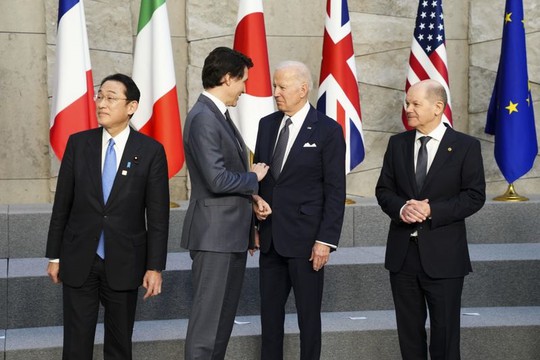From the left: Kishida, Trudeau, Biden and Scholz.
Photo: ZUMA
Facing looming national elections, Japan’s Fumio Kishida (already retired), Canada’s Justin Trudeau and Germany’s Olaf Scholz have all faced calls to follow in the U.S. president’s footsteps, writes POLITICO.
When President Joe Biden exited the presidential race to make way for Vice President Kamala Harris this summer, he knew his decision would be closely watched around the world.
What he didn’t realize is that it would make “doing a Biden” the new political shorthand for an embattled national leader who sees the writing on the wall and steps aside for others within his party. Or the move’s ripple effects: setting an example for those within democracies closely tied to the United States to pressure their own leaders to step down.
At least three unpopular leaders facing looming national elections — Japanese Prime Minister Fumio Kishida, Canadian Prime Minister Justin Trudeau and German Chancellor Olaf Scholz — have felt that pressure themselves in the two months since Biden bowed out.
“Why isn’t Scholz doing a Biden?” asked the German news magazine Der Spiegel earlier this month after a string of regional election losses, saying the chancellor “would be doing his party, his country and himself a favor” by stepping aside. This summer, in the wake of Biden’s announcement, the Canadian broadcaster CBC posed the question: “Could Trudeau go next?” And the already retired Kishida was “having a Biden moment” when he stepped down as the leader of his party last month, one expert quipped.
But the explicit references to Biden making the rounds in Tokyo, Ottawa and Berlin are proof that his decision in July has established a global model for a politician doing the most unnatural thing: choosing to willingly give up power without defeat or death.
Kishida, Trudeau and Scholz are oceans apart, but they have found themselves in remarkably similar political territory in recent months facing suggestions they follow in Biden’s footsteps and call it quits.
All three leaders, well into their terms and increasingly unpopular, have been bombarded with questions from within their parties — Japan’s Liberal Democratic Party, Canada’s Liberals and Germany’s Social Democrats, respectively — about whether they’re the right standard-bearers for national elections in each country slated for next year.
Kishida, first elected as Japan’s prime minister and head of his LDP party in 2021, has faced declining approval ratings after a series of corruption scandals rocked his party. On Friday, Kishida’s LDP elected its new president — and he wasn’t among the hopefuls vying for the job.
Scholz, who took over from Angela Merkel as chancellor just two months after Kishida became Japan’s prime minister, has been fighting for political survival amid record-low approval ratings. Like Biden, he’s faced calls to yield to a politician better positioned to lead the center-left SPD in next year’s federal election.
“There is a deep disappointment with the government, with the coalition and with Scholz,” Peter Matuschek, chief political analyst at the German polling firm Forsa, told POLITICO.
That disappointment with Scholz’s government stems from both the Ukraine war’s ongoing impact on Germany and infighting within Scholz’s three-party governing coalition. Scholz’s approval rating stood at just 20 percent earlier this month, according to a poll from the German broadcaster ARD.
“The chancellor could follow the example of U.S. President Joe Biden: Instead of clinging to power and letting himself be taken apart piece by piece in the coming months, he is clearing the way for a new political start,” Spiegel wrote in its daily politics newsletter earlier this month.
Polling out from Matuschek’s Forsa finds that two-thirds of German voters — including 63 percent of those who voted for the SPD in the last federal election — agree Scholz should step aside and allow Pistorius to run as the SPD’s chancellor candidate.
And across the Atlantic, Trudeau faces serious questions about how much longer his third term as prime minister can last. Trudeau, who came into office in 2015 promising “real change,” has been weakened by a series of scandals throughout his tenure and saw his Liberals’ support erode further in the 2019 and 2021 elections.
This year, a special election for a Toronto-area parliamentary district in June signaled more acute trouble for Trudeau’s Liberals, who lost a seat the party had held for 30 years. The vote, which came just days before the disastrous debate performance that ultimately doomed Biden, prompted comparisons between two stubborn North American leaders clinging to power.
A loss in a second special election for the Liberals, this time in Trudeau’s home region of Montréal — just days after his party’s governing partner in parliament announced it would quit the informal alliance — led to more explicit demands to leave office. As in Japan and Germany, Biden’s example loomed as an analogy. “Is it time for Justin Trudeau to Be Like Joe?” one columnist asked.
Of the three politicians facing these calls to emulate Biden, only Kishida has thus far surrendered — both Trudeau and Scholz are holding their ground and appear unlikely to bow out any time soon, POLITICO concludes.
read more in our Telegram-channel https://t.me/The_International_Affairs

 10:53 09.10.2024 •
10:53 09.10.2024 •























